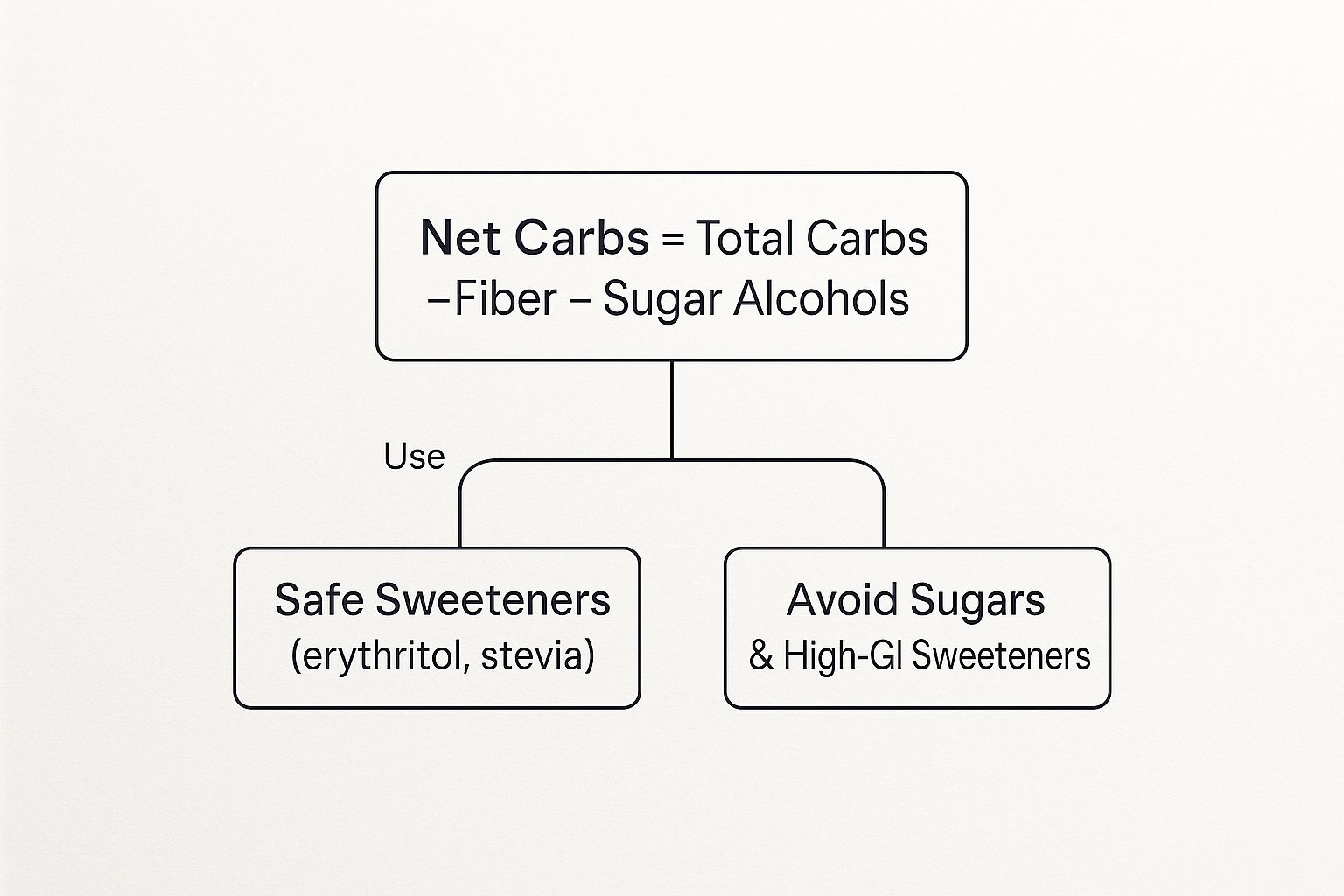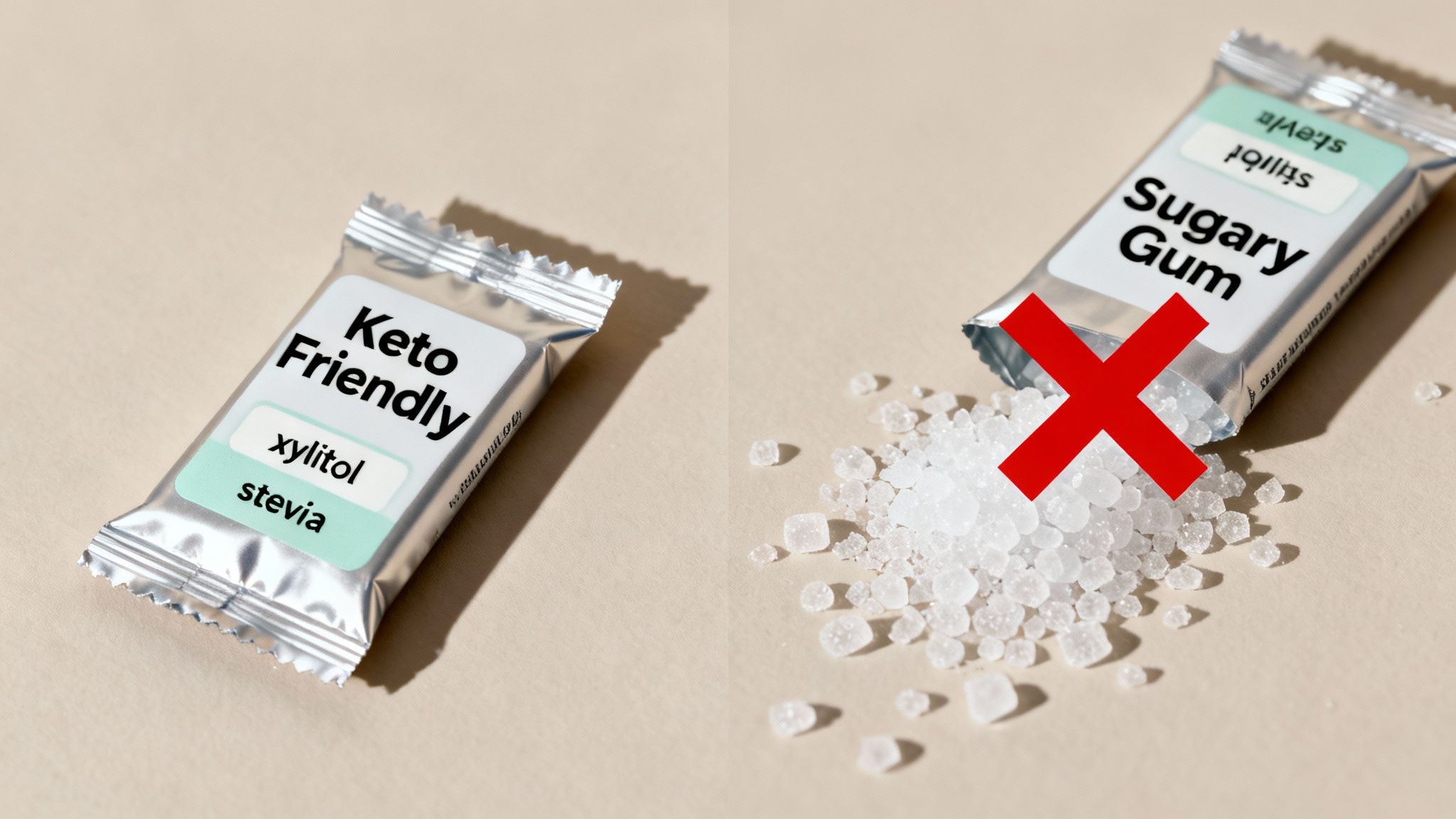Chewing Gum on Keto Your Guide to Staying on Track
Good news for gum chewers—yes, you can absolutely have chewing gum on keto. The trick is knowing which ones to grab and which to leave on the shelf.
While a pack of "sugar-free" gum seems like a safe bet, some are loaded with sneaky sweeteners that can mess with your blood sugar and kick you out of ketosis. The real key is to flip over the package and look for keto-friendly sweeteners like stevia, xylitol, or erythritol.
Your Quick Guide to Keto Gum
Finding keto-friendly snacks can feel like navigating a minefield, but it gets a lot easier once you know the rules. When it comes to chewing gum, the mission is simple: avoid sugar and anything that acts like sugar in your body.
It all comes down to net carbs—the carbs your body actually digests and uses for energy. Master this, and you're golden.
This visual breaks it down perfectly.

As you can see, you just subtract the fiber and sugar alcohols from the total carbs. That final number is what really counts on keto.
Making Smart Choices
Thankfully, the market has caught up, and there are plenty of great keto gum options out there. A European review of 33 different keto gum products found that a typical serving has just 3.7 grams of carbohydrates.
Better yet, most of those carbs come from sugar alcohols that don't spike your blood sugar. You can dive into the full analysis of low-carb gum products if you want to see the data for yourself.
This makes the right kind of gum a fantastic tool for crushing cravings without derailing your progress. Some gums even go a step further, packing in ingredients designed to boost mental clarity and performance. To see how functional ingredients can support your goals, check out our 2025 guide to the best focus and energy gum.
To make things even easier, here’s a quick cheat sheet to help you make smart choices at a glance.
Keto Gum Cheat Sheet At a Glance
This table breaks down the good, the bad, and the ugly of chewing gum ingredients so you know exactly what to look for.
| Feature | Keto-Friendly Gum (Safe) | Non-Keto Gum (Avoid) |
|---|---|---|
| Primary Sweeteners | Stevia, Erythritol, Xylitol, Monk Fruit | Sugar, High Fructose Corn Syrup, Aspartame, Sucralose, Maltitol |
| Net Carbs per Piece | Typically 0-1g | Often 2g or more |
| Impact on Ketosis | Minimal to none. Doesn't spike blood sugar or insulin. | Can spike blood sugar and potentially knock you out of ketosis. |
| Common Brands | Pür, Spry, Epic Dental, Zellie's | Trident, Orbit (some varieties), Extra, Wrigley's |
| Labeling to Look For | "Sweetened with Xylitol," "Stevia," "Erythritol" | "Sugar-Free" (but check the specific sweetener), "Artificially Sweetened" |
Think of this as your back-pocket guide. If the ingredients list features anything from the "Safe" column, you're good to go. If it's loaded with sweeteners from the "Avoid" column, it's best to put it back.
Decoding Sweeteners and Sugar Alcohols

When you’re deep into the keto lifestyle, seeing "sugar-free" on a pack of gum feels like a win. But hold on—not all sweeteners get the same green light. Some can still mess with your blood sugar, making it crucial to know what you’re looking for if you're serious about chewing gum on keto.
The magic ingredient in most keto-friendly gums is a class of sweeteners called sugar alcohols. Imagine them as a key that perfectly fits the "sweetness" lock on your tastebuds but doesn't quite turn the ignition in your body's energy engine. They taste sweet, but your digestive system only partially absorbs them.
Because they aren't fully broken down, their impact on blood glucose and insulin is minimal. This is exactly why they're a go-to for keto products. It also means you can subtract most of their grams from the total carbs to figure out the real net carb count.
The Good Guys: Keto-Friendly Sweeteners
When you're scanning that nutrition label, a few names should give you the all-clear. These are the sweeteners that play nice with a keto diet and won’t kick you out of ketosis.
Here are the top keto-approved sweeteners you want to see:
- Erythritol: This is often called the gold standard for keto. With a glycemic index of zero, it’s almost entirely flushed out of your system without being used for energy.
- Xylitol: You’ll find this one in a lot of dental products because it’s great for your teeth. It has a super low glycemic index, making it a solid choice. Just be mindful that it has a small carb impact if you consume a ton of it.
- Stevia: A natural, plant-based sweetener with zero calories and zero carbs. It’s another perfect option for staying in ketosis.
- Monk Fruit: Like stevia, this natural sweetener is a zero-calorie, zero-carb hero that won't disrupt your metabolic state.
These sweeteners make it possible to get your chew on without the metabolic hit from real sugar. In fact, many modern gums go beyond just freshening your breath. For a look at gums packed with functional ingredients, check out our guide on nootropic gum for enhanced focus.
Sweeteners to Approach with Caution
Now for the other side of the coin. Some sugar alcohols and artificial sweeteners can be problematic. Even though they’re technically "sugar-free," they can still trigger an insulin response or, at the very least, cause some digestive issues for certain people.
The goal is to find a gum that satisfies your craving for a sweet taste without triggering the same metabolic reaction as actual sugar. The right sweetener makes all the difference.
Keep an eye out for ingredients like maltitol. It has a higher glycemic index than other sugar alcohols and is far more likely to spike your blood sugar. Others, like aspartame and sucralose, don’t contain carbs, but many people choose to avoid them due to ongoing health debates. Your best defense is always to read the label carefully.
The Best and Worst Gums for Your Keto Diet

Alright, now that you know which sweeteners get the green light, let’s put that knowledge to work in the real world. Hitting the gum aisle feels a lot less intimidating when you know exactly what to grab and what to leave on the shelf. The right gum can be a great tool on keto; the wrong one can throw a wrench in your progress with sneaky carbs.
The best gums for keto are hands-down the ones sweetened with xylitol, erythritol, stevia, or monk fruit. These guys barely move the needle on your blood sugar, making them perfect for staying in ketosis while freshening your breath or kicking a sugar craving.
Keto-Approved Chewing Gums
When you’re shopping, zero in on brands that make it obvious they’re using keto-friendly sweeteners. These are almost always a safe bet for your low-carb lifestyle.
Here are a few top-tier choices you can find pretty easily:
- Pür Gum: Sweetened with 100% xylitol, this brand is a huge favorite in the keto community. It’s also free of aspartame, which is a big plus for a lot of people.
- Spry Dental Defense Gum: Here's another fantastic option that relies on xylitol. It’s even designed specifically to boost your dental health.
- Epic Dental Gum: Just like the others, Epic is sweetened only with xylitol. It comes in a bunch of flavors without any of those hidden sugars or other junk ingredients.
These brands make it simple to stick to your goals. And if you’re looking for more than just a fresh flavor, some gums offer an extra cognitive edge. Our own Dialed In Nootropic Focus Gum, for example, is designed to be keto-friendly while also sharpening your mental clarity and concentration. You can buy Dialed In directly from our website.
Gums to Watch Out For
On the other side of the coin are the gums that can quietly sabotage your efforts. A lot of them are labeled "sugar-free," but they’re often packed with sweeteners that seasoned keto dieters avoid—either because they can spike blood sugar or for other health concerns.
The term "sugar-free" isn't a free pass on keto. Always flip the pack over and read the full ingredient list to see what’s really inside.
Many of the big household names, including some types of Trident, Orbit, and Extra, use a cocktail of sweeteners like aspartame, sucralose, and sorbitol. But the biggest offender to keep an eye out for is maltitol. It's a sugar alcohol with a higher glycemic index that can definitely kick sensitive people out of ketosis.
Ultimately, your best defense is to become a label detective. Stick to gums sweetened with xylitol, erythritol, and stevia, and you can chew with total confidence.
How Gum Can Actually Support Your Keto Goals
 Beyond just freshening your breath, the right gum is a surprisingly effective tool in your keto toolkit. It can help you conquer two of the biggest hurdles on any low-carb journey—those persistent cravings and the nagging hunger pangs that pop up between meals.
Beyond just freshening your breath, the right gum is a surprisingly effective tool in your keto toolkit. It can help you conquer two of the biggest hurdles on any low-carb journey—those persistent cravings and the nagging hunger pangs that pop up between meals.
The simple act of chewing sends powerful signals to your brain, creating a sense of satisfaction that can quiet the urge to grab a carb-heavy snack. It's less of a treat and more of a clever bio-hack for maintaining discipline. Chewing stimulates saliva production, which helps neutralize acids, but it also tricks your brain into thinking you’re eating, helping to manage your appetite without adding carbs or calories.
Mastering Your Cravings
This isn't just a feeling; there’s some real science to back it up. Chewing gum has been shown to offer modest benefits for appetite control, a huge win for anyone on a ketogenic diet.
Studies indicate that the act of chewing can reduce feelings of hunger and make you less likely to reach for a snack, especially the high-carb kind. You can discover the findings on gum and appetite control on Healthline.com to see the data for yourself.
By satisfying the oral fixation that often drives snacking, a good keto gum acts as a placeholder, giving you the time and mental space to stick to your planned meals.
This makes chewing gum on keto a genuinely strategic move to stay on track.
And for those looking to combine this benefit with an extra mental boost, some functional gums are designed to do just that. You can read our comparison of Dialed In vs. Neuro Gum to see how some products offer more than just flavor. Ultimately, using gum strategically can help you stay firmly on the path toward your health goals.
Common Mistakes and Downsides to Avoid
https://www.youtube.com/embed/kfuyZuGI4aw
Keto-friendly chewing gum can be a great tool, but a few common slip-ups can turn this helpful habit into a hidden source of trouble. The most classic mistake is assuming any "sugar-free" label means it's safe for keto. It's not always true. Many products use sweeteners like maltitol that can still mess with your blood sugar, so you absolutely have to check the ingredient list.
Another easy trap to fall into is underestimating the carb creep. Sure, one piece of gum might only have a single gram of net carbs, but if you're chewing multiple pieces throughout the day, those carbs can add up surprisingly fast. This is why moderation is so crucial when you’re trying to stay in ketosis.
It's easy to forget that gum isn't a "free" food. For adults, the average is about one piece a day, but plenty of people chew more. Studies show the daily mean is 2.98 grams for adults, with some hitting 7.67 grams—that's roughly three pieces. To see the data for yourself, you can learn more about daily gum consumption habits here.
The Digestive Downside of Sugar Alcohols
One of the biggest complaints about keto gum is the potential for digestive distress. Sugar alcohols like sorbitol, xylitol, and erythritol aren't fully digested, which is why they have such a minimal impact on your blood sugar. But that exact quality can cause a riot in your gut.
When you have too much, these sweeteners pull water into your intestines and start to ferment, leading to some pretty uncomfortable side effects.
- Bloating and Gas: This is the most common issue. As those undigested sugar alcohols ferment in your large intestine, you'll definitely feel it.
- Laxative Effect: In larger amounts, some sugar alcohols—especially sorbitol and mannitol—can have a serious laxative effect.
Remember, everyone's tolerance is different. What works for your friend might cause you a world of discomfort. It's always a good idea to start with just one piece to see how your body reacts before making keto gum a daily habit.
To steer clear of these problems, listen to your body and stick to just a few pieces a day. And if you want a gum that’s specifically designed for performance without all the junk, check out our keto-friendly Dialed In Nootropic Focus Gum. You can purchase it here.
Keto Gum FAQs
Even when you know the basics, a few questions always seem to pop up about chewing gum on keto. We get it. So, we've rounded up the most common ones to give you clear, straightforward answers.
Think of this as your quick-reference guide to chewing with confidence.
How Much Keto Gum Can I Chew Per Day?
There's no single magic number here, but moderation is always the best approach. Most keto-friendly gums land around 1-2 grams of net carbs per piece.
For most people, sticking to 1-3 pieces a day is a safe bet. This amount is unlikely to kick you out of ketosis or cause the digestive upset that can sometimes come with sugar alcohols. Always double-check the label on your specific gum and track it like you would anything else.
Will Chewing Gum Break a Fast?
This is a hot topic, and the answer really depends on why you're fasting.
If you’re doing a strict, therapeutic fast, then yes—technically, gum is off the table. Anything that contains calories or could trigger even a minor insulin response is a no-go, and some sweeteners can cause a small metabolic reaction.
However, if you're practicing more flexible intermittent fasting for general wellness or weight management, a single piece of zero-calorie, keto-friendly gum probably won't make a meaningful difference to your results.
Got more questions about our products or ingredients? Check out our full FAQ page for more in-depth answers.
Does Aspartame Kick You Out of Ketosis?
From a purely metabolic standpoint, no. Aspartame won't kick you out of ketosis. It’s a zero-calorie artificial sweetener that doesn’t raise blood sugar or insulin levels in most people.
That said, many people in the keto community prefer to steer clear of artificial sweeteners like aspartame for other health reasons. They usually gravitate toward natural, keto-approved options like stevia, erythritol, and xylitol instead.
Ready to chew with purpose? Dialed In offers keto-friendly Focus Gum designed to sharpen your mind without the sugar crash.

